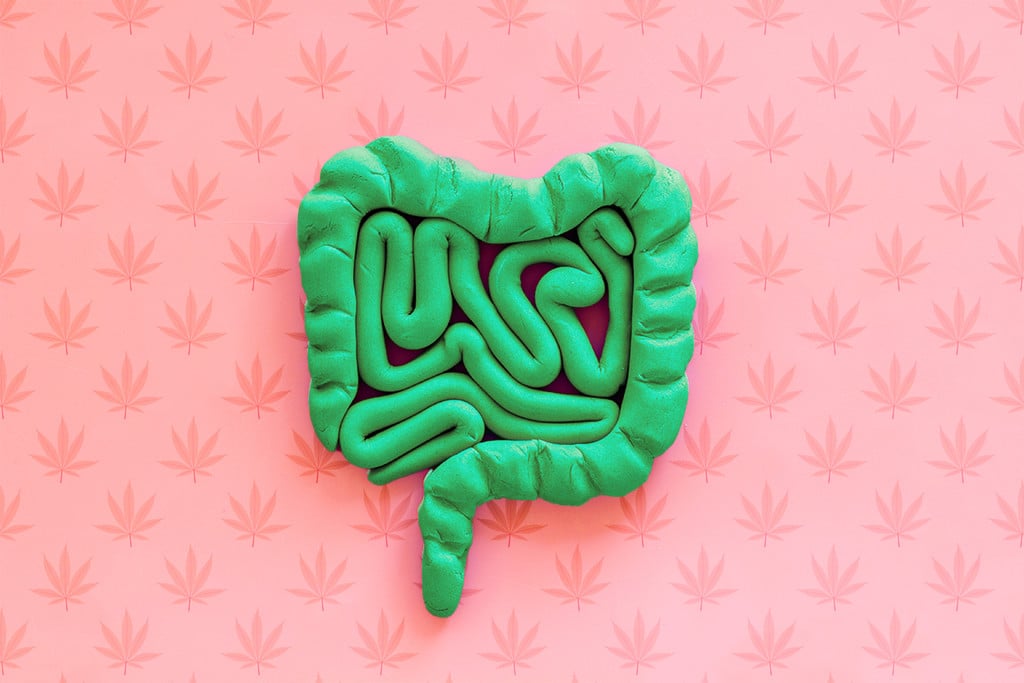.

Cannabis, CBD, and Gastritis: What's the Relationship?
Studies continue to unveil the important role of the endocannabinoid system in the digestive system and, more specifically, the human gut. Ongoing research is also studying cannabinoids in models of certain digestive disorders, including irritable bowel syndrome. Now, people are keen to know if cannabinoids, such as CBD and THC, impact gastritis.
Contents:
Gastritis has numerous causes, from bacterial infection to excess alcohol intake. Conventional medicine has developed some effective ways to treat the condition, including various medications and lifestyle changes. But as researchers continue to uncover the role of the endocannabinoid system in the gut, interested parties are wondering whether cannabis has any effect on gastritis symptoms.
What Is Gastritis?
The term “gastritis” encompasses several conditions that all share one characteristic: inflammation of the stomach lining.
As you might remember from biology class, the stomach contains highly acidic gastric juices that help to break down the food that you eat. To protect your tissues against this potent fluid, the stomach features a lining of mucus (called the mucosa). Under normal circumstances, this specialised layer simply fulfils its purpose with no issues. However, events that damage the stomach lining or cause it to become inflamed trigger gastritis. The painful symptoms of this condition mean patients quickly become serious about finding a valid solution.
Types of Gastritis
Though there are several types of gastritis, they all autumn into one of two categories: acute or chronic. Acute bouts of the condition are often triggered by irritants or infection, and are characterised by sharp bursts of pain that settle quickly. In contrast, chronic gastritis lasts over long periods, involves a dull and long-lasting ache, and can develop into more serious conditions if left untreated. There are a host of different causes of gastritis, the most common of which we examine below.
- Helicobacter pylori Infection
This gram-negative spiral bacterium is the most common cause of gastritis across the world. Disturbingly, this microbial species developed its odd shape as a means of penetrating the lining of the stomach. However, it leaves most people feeling unaffected.
H. pylori has a prolific reputation, and it’s thought that around half the world’s population has this infection—most people simply don’t realise. Researchers aren’t entirely sure why so many people don’t show symptoms, but it likely has something to do with innate resistance within asymptomatic people. Those that aren’t so lucky often develop gastritis and stomach ulcers when exposed to this pathogen.
- Other Pathogens
H. pylori isn’t the only microbe that can infect the gut lining and cause inflammation and gastritis. Other organisms that can trigger the condition include species of mycobacterium, herpes simplex, and parasites.
- Autoimmune Gastritis
Autoimmunity occurs when immune cells start to attack healthy cells within the body, mistaking them for threatening invaders. This self-inflicted cellular assault manifests in a wide range of conditions including rheumatoid arthritis, celiac disease, and thyroiditis. This malfunction in the immune system can also cause autoimmune gastritis.
In this condition, immune cells target and destroy parietal cells[1] (the cells in the stomach wall that secrete acid). This condition mostly shows up in young women and can lead to iron and vitamin B12 deficiency.


- Crohn’s Disease
As a type of inflammatory bowel disease, Crohn’s causes inflammatory flare-ups in the digestive tract that lead to unpleasant symptoms such as pain, fatigue, and diarrhoea. Crohn’s patients are more at risk of developing a type of gastritis that doesn’t stem from an H. pylori infection.
- Aspirin
Have you ever taken anti-inflammatories and felt kind of queasy? While medications such as aspirin help to take the edge off aches and pains, acute haemorrhagic gastritis occurs in 50–80% of all patients[2] that take the drug. How does aspirin cause this bleeding? Researchers aren’t 100% sure, but it likely involves physical erosion of the gut barrier and the diffusion of hydrogen ions across the mucosa.
- Excess Alcohol
Drinking too much alcohol too frequently can result in alcoholic gastritis. Over time, large and consistent quantities of alcohol begin to irritate the gut lining, sparking inflammation and subsequent gastritis.
What Are the Symptoms of Gastritis?
Despite the varying underlying causes of gastritis, the different forms result in similar symptoms, including:
| Recurring stomach upset | Nausea | Vomiting | Abdominal pain | Indigestion |
| Burning feeling in the stomach | Reduced appetite | Hiccups | Vomiting blood | Black stool |
| Recurring stomach upset | Nausea |
| Vomiting | Abdominal pain |
| Indigestion | Burning feeling in the stomach |
| Reduced appetite | Hiccups |
| Vomiting blood | Black stool |
Is Gastritis Dangerous?
Thankfully, gastritis doesn’t cause long-term issues in most people. With the appropriate treatment, patients can expect to return to full health. However, complications can make the condition dangerous. In some instances, gastritis can develop into more serious conditions such as stomach ulcers, and increase the risk of stomach cancer.
Current Treatments for Gastritis
There are various treatments available for patients with gastritis, from medications that reduce stomach acid production to simple lifestyle changes. In what follows, we explore the most common in greater detail.
Medications
Patients are prescribed different medications for gastritis depending on the cause of the condition:
- Antibiotics: Antibiotics such as amoxicillin are used to wipe out H. pylori infections
- Proton pump inhibitors: These drugs work by blocking parts of cells that produce acid
- Histamine blockers: Also known as acid blockers, these drugs decrease the amount of acid churned out in the stomach
- Antacids: Antacids are prescribed to neutralise stomach acid and help manage stomach pain

Lifestyle Adjustments
On top of medications, doctors also advise patients to make several lifestyle changes to reduce the symptoms of gastritis:
- Avoid triggering foods: Certain foods can irritate the gut lining, including spicy and fatty dishes, so it’s best to avoid them
- Consume less alcohol: Cut down or completely abstain from alcohol
- Eating schedule: Eat smaller meals, but more frequently throughout the day


Cannabis and Gastritis: Is There an Association?
Patients have plenty of options already, so where does cannabis stand when it comes to gastritis? Unfortunately, we don’t know. Without clinical trials testing isolated cannabinoids and full-spectrum extracts in a randomised placebo-controlled process, a definitive answer doesn’t exist.
However, ongoing research around cannabinoids and the gut offers some interesting insight. Adding to that, scientists have made some headway in understanding the role of the endocannabinoid system (ECS), the main target of phytocannabinoids, in the gut.
The Link Between the Endocannabinoid System and Gastritis
To get an idea of what we can expect from future research regarding cannabis and gastritis, it helps to know a thing or two about the ECS. This system helps to keep all of the other systems of the body in a state of homeostasis, or biological balance. You’ll find the ECS facilitating this balancing act in the central nervous system, immune system, skin, bones, heart, connective tissues, and digestive system.
This expansive regulatory network features three main parts: receptors, signalling molecules (endocannabinoids), and enzymes that create and break down endocannabinoids. It just so happens that chemicals found in cannabis (and a host of other plants), known as phytocannabinoids, share a similar molecular structure to the endocannabinoids made by our bodies. This enables them to interact with ECS receptors and create similar changes within target cells.
Endocannabinoids play key functions in the digestive system, including those involved in gut motility[3], interactions with gut microbes, inflammation, and gut permeability. Researchers are also exploring the role of ECS receptors and enzymes[4] as targets to reduce the development of gastrointestinal mucosal lesions, haemorrhage, and inflammation.
So, we know the ECS plays a role in gut health and inflammation, which implicates it in gastritis. But what effect, if any, do cannabinoids have on the ECS in regard to this condition?
The Relationship Between Cannabinoids and Gastritis
As mentioned above, no trials have yet pitched individual cannabinoids or mixed formulations against gastritis in humans. However, plenty of studies are testing these chemicals in models of the symptoms of gastritis, including pain, inflammation, and nausea. Let’s take a look at what the research says about THC and CBD, the two most prominent cannabinoids in modern cultivars.
| THC |
Can smoking THC-rich joints or eating edibles impact the symptoms of gastritis? There’s no answer to this question yet. But researchers know that the endocannabinoid system holds sway over pain signalling in the body. Ongoing studies are looking to discover if THC has any meaningful effect on the ECS when it comes to pain transmission. Some patients that experience gastritis also develop nausea. Trials are testing THC[5], alongside CBD, to determine its impact on chemotherapy-induced nausea and vomiting in human subjects. |
| CBD |
Unlike THC, CBD doesn’t bind to CB1 receptors of the ECS. Put simply, this means it doesn’t produce the same euphoric high. In fact, CBD has a low affinity for the major receptors that make up the ECS. Instead, it manages to inhibit enzymes that break down anandamide, one of the main endocannabinoids in the body. Interestingly, researchers are testing the ability of ECS enzyme inhibitors[6] in models of gastrointestinal damage and inflammation caused by anti-inflammatory drugs. Furthermore, many ongoing studies are researching CBD in models of inflammation, including inflammatory bowel disease[7]. |
| THC |
|
Can smoking THC-rich joints or eating edibles impact the symptoms of gastritis? There’s no answer to this question yet. But researchers know that the endocannabinoid system holds sway over pain signalling in the body. Ongoing studies are looking to discover if THC has any meaningful effect on the ECS when it comes to pain transmission. Some patients that experience gastritis also develop nausea. Trials are testing THC[5], alongside CBD, to determine its impact on chemotherapy-induced nausea and vomiting in human subjects. |
| CBD |
|
Unlike THC, CBD doesn’t bind to CB1 receptors of the ECS. Put simply, this means it doesn’t produce the same euphoric high. In fact, CBD has a low affinity for the major receptors that make up the ECS. Instead, it manages to inhibit enzymes that break down anandamide, one of the main endocannabinoids in the body. Interestingly, researchers are testing the ability of ECS enzyme inhibitors[6] in models of gastrointestinal damage and inflammation caused by anti-inflammatory drugs. Furthermore, many ongoing studies are researching CBD in models of inflammation, including inflammatory bowel disease[7]. |
How Are Cannabis Compounds Consumed?
Regardless of the exact relationship between cannabis and gastritis, it’s helpful to know the different intake methods for THC and CBD so you can make an informed purchase decision, should you choose to use them. Here are the most relevant methods for our purposes:
- Inhalation: Both smoking and vaping rapidly introduce cannabinoids into the bloodstream, but they also come with obvious cardiorespiratory dangers.
- Oral: Cannabis-infused foods and beverages are a tasty way to consume marijuana and CBD, but they take a while to set in and have poor bioavailability. That said, they travel through the digestive system and liver before reaching systemic circulation, which some users may find advantageous.
- Sublingual: This route involves placing cannabinoid oils and extracts under the tongue. Here, they diffuse directly into the bloodstream to produce a rapid onset of effects.
Does Cannabis Cause Gastritis?
Cannabinoids are able to interface with ECS receptors in the digestive system. But this raises the possibility that too much cannabis taken too frequently could upset the delicate balance of this network. No compelling evidence exists that shows cannabis to trigger gastritis. However, cannabis can cause cannabis hyperemesis syndrome in chronic users, a condition characterised by abdominal pain and continuous vomiting, but the causes of these conditions are unrelated.
Legality of Cannabis and CBD
The legal status of cannabis and CBD varies wildly from country to country, and even within a single country. Although federally illegal in the United States, citizens of select states can legally purchase recreational cannabis from dispensaries in accordance with state law. Most countries in Europe have outlawed high-THC cannabis, but many of them allow the sale of CBD products such as oils and low-THC hemp flowers.
Cannabis and Gastritis: More Evidence Is Needed
The current body of research on the effects of cannabis on models of inflammation and pain offers some insights, but well-designed human trials are vital to determine if cannabis offers anything valuable. While no such research exists, the trend of cannabis legalization throughout the world will help to prompt more comprehensive studies in the near future.
- Autoimmune gastritis - PMC https://www.ncbi.nlm.nih.gov
- Aspirin-induced gastritis and gastrointestinal bleeding - PubMed https://pubmed.ncbi.nlm.nih.gov
- Endocannabinoids in the Gut - PMC https://www.ncbi.nlm.nih.gov
- Role of Cannabinoids in Gastrointestinal Mucosal Defense and Inflammation - PMC https://www.ncbi.nlm.nih.gov
- Oral cannabinoid-rich THC/CBD cannabis extract for secondary prevention of chemotherapy-induced nausea and vomiting: a study protocol for a pilot and definitive randomised double-blind placebo-controlled trial (CannabisCINV) | BMJ Open https://bmjopen.bmj.com
- Role of Cannabinoids in Gastrointestinal Mucosal Defense and Inflammation - PMC https://www.ncbi.nlm.nih.gov
- Cannabidiol in Inflammatory Bowel Diseases: A Brief Overview https://onlinelibrary.wiley.com






































